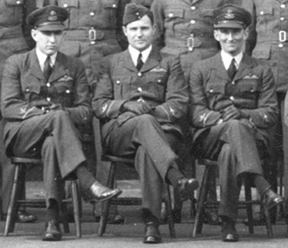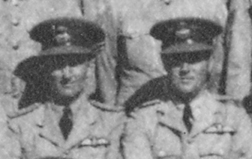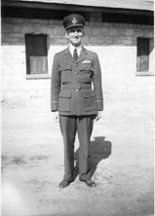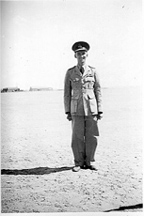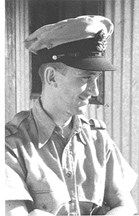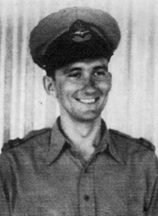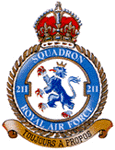 |
 |
|||||||
|
Squadron Leader William Henry Edwards 40045 RAF DFC 1915—1955 The Edwards family came to Australia in the late 19th century, when painter William Edwards and his wife Catherine settled in the inner Sydney waterside suburb, Balmain. There, in 1874, their son Alfred was born. The family connection with the inner west was to continue for sixty years or more. Alfred and his wife were living in nearby Leichhardt when their youngest son, WH “Bill” Edwards, was born on 18 October 1915. Educated at Orange Grove School in Perry St and later at Leichhardt Public School, Bill left in 1929 for Sydney Technical High School, then at Paddington, to take his Intermediate Certificate in 1930, before going on to an engineering course in the Sydney Technical College at Ultimo. It was at High School that he first met Allan Farrington. With jobs scarce in the Depression, young Bill found work at a timber yard about five miles away at Rhodes and also as a lorry driver, before entering the RAAF in 1936. He and Farrington were both selected as cadet pilots for the July 1936 ‘A’ Cadet course entry, passing out of 1 FTS RAAF Point Cook in July 1937. During its early 1920s re-organisation, the RAAF had reached agreement with the RAF upon a mutually beneficial development programme for the annual transfer, on Short Service Commissions, of some of the Point Cook pilot graduates. Though with somewhat mixed feelings on both sides, the scheme continued each year until July 1938, with 10 or 20 new RAAF officer candidates transferring to the RAF each year, on 4 or 5 year postings. Bill Edwards and Allan Farrington were both among the 24 RAAF pilots of the July 1937 (and last but one) group selected for RAF service under this programme. Arriving in England on 26th August 1937, Edwards was awarded a 5 year short-service commission in the RAF as a Pilot Officer. To 211 Squadron Geoff Grierson’s Log Book entries suggest that he flew as air gunner to Edwards in Hinds on several occasions at Grantham in 1938. From his fine prints of official group shots at Grantham and at Helwan, this face appears smiling from the mist.
Taken from the 211 Squadron shot at Grantham in Geoff Grierson’s albums, newly commissioned Australian 40045 Pilot Officer William Henry Edwards on the right. The identity of the other two men was uncovered by careful search and enquiry, as discussed on the RAAF personnel page: 40046 Pilot Officer Allan Leonard Farrington (left) and 39453 P/O Donovan Gerhard Boehm (centre). All three men wear the RAAF eagle badge in its customary place, on the sleeve above the braid of the thin Pilot Officer’s ring. The three were 1936 pilot cadets at RAAF Point Cook, selected on graduation for RAF commissions under the pre-war RAAF/RAF exchange scheme. As an unexpected bonus, the records also showed that on formation of 211 Squadron in 1937, a fourth Australian had been posted in: 39455 P/O Douglas Alexander Cameron, another RAAF Pt Cook graduate. The Australian connection with the “Greyhounds” is long indeed!
First identified by the sharp eyes of Mike Grierson, the smile and the hat remain the same. Enlarged from Grierson’s Helwan 1938 211 Squadron group shot, this is surely Bill Edwards in the Middle East. Bill Edwards’ family are justifiably confident that it is indeed him. Possibly DG Boehm, right. Edwards spent the 21 month period before war was declared with 211 Squadron, transferring with them and their Hinds to the Middle East, and later ferrying Bristol Blenheim aircraft out to Palestine and the Suez Canal during his service. Bill was one of those whose early ME service was marked with the General Service Medal, Palestine Clasp. Promoted to Flying Officer on 26 May 1939, there are several photographs of him in the Middle East in uniform, but they do not show any landmarks or features that would identify the location with certainty.
The stone building is of a familiar type. The flat expanse of the tropical kit shot is reminiscent of Helwan and of Abu Sueir, but equally of the Western Desert. The ranked hangars in the left background of the centre shot may provide sufficient clue, eventually. There were no such facilities at Dabaa. All clearly “somewhere in the Middle East”, these photos from the Edwards family were without further identification until 2007. In revisiting this part of his grandfather’s story, Ross Edwards found a second print of one of these shots, noted on the rear as Helwan. Other RAF men came to use this spot as backgrond to a casual photo.
Clearly the same occasion as the third shot, above. To 107 Squadron Edwards was to remain in England, transferring to 107 Squadron of No 2 Group Bomber Command at Wattisham on 14 September 1939. In April 1940 the Squadron, led by CO W/Cdr Basil Embry, raided Stavanger Airfield in Norway under conditions of great difficulty. Bill Edwards and Basil Embry were both decorated for this action, the CO with a Bar to his DSO and Edwards with the DFC. The London Gazette of 30 April 1940 records: “Air Ministry, 30th April, 1940 Awarded the Distinguished Flying Cross On 12 May 1940, 12 Blenheims from 107 Squadron took off from Wattisham for a raid on the Maastricht bridges, as the Wehrmacht advanced to cross the Meuse into Belgium. W/Cdr Embry (later ACM Sir Basil Embry GCB KBE DSO & 3 Bars DFC AFC) was again leading the Squadron. For this raid, Edwards was pilot of Blenheim IV P4905 OM-P, flying with his Stavanger crew Sgt VGL Luter (Observer) and LAC WE Palmer (WOp/AG). They were shot down by Bf109s shortly after attacking the target. Crashing in Belgium near Bettenhoven, Edwards and Luter became PoWs—sadly Palmer did not survive. The Squadron lost four other aircraft and their crews that day. On this occasion, Edwards was slightly mis-recorded in the Squadron record. Captivity and freedom His repatriation to the UK in September 1944 resulted in a bit of a kerfuffle. The party came through Sweden and the Swedish Press got hold of the story—perhaps by someone a bit quick off the mark at the Embassy. The story reached the Australian press almost as quickly, Edwards and other PoWs names appearing in the papers before RAF, Air Ministry or RAAF telegrams formally advising repatriation and safe arrival in the UK had been sent to the families! The official repatriation advice listed a number of the party as arriving in the UK "fit and well", however Bill Edwards is listed in the advice without remark as to his condition. After repatriation, he remained at 1 Personnel Holding Unit for some months, noted there in the sparse jargon of the service that meant he was a supernumerary, ill enough to be classed as part of the non-effective establishment of the unit. In January 1945 he was sufficiently recovered to be posted to the RAF School of Administration at Rivenhall, under training for Administration and Special Duties Branch. In March came a posting as Adjutant to a station almost the stuff of legend, RAF Coltishall. Later, he requalified as an Equipment Officer and postings to 246 MU, then RAF Bicester, RAF Hereford, RAF Innsworth and RAF Odiham followed. At St Nicholas Parish Church of Witham, Daintree, on 17 May 1945, Bill Edwards married Monica Wingate, an English WAAF Officer. Promoted Squadron Leader 19 April 1948, in the Spring of 1952, he reverted to the RAF Reserve of Officers and prepared for repatriation to Australia. Of the four 1936 cadets of RAAF Point Cook who had joined 211 Squadron before the war, he was the sole survivor. On leaving the RAF, his service record shows his latest medical category as A4 (non-combatant passenger) - that is, no longer a pilot, his ill-health apparently resulted in this restriction to non-flying duties. Aged just 39, Bill Edwards died on 30 September 1955 at the Repatriation Hospital, Concord, New South Wales from that illness which had apparently been brought about by his injuries and four years in German Prisoner of War camps. Monica decided to stay in Australia to bring up her son and daughter. In later life, remarried, she had made her life in Australia and was able to take the journey to England just once, to visit her only sibling Doreen. Monica died on 8 October 1994 after a short illness. She rests at Ourimbah, North of Gosford on the Central Coast of New South Wales. A Serviceman remembered Bill’s service is recorded in Herington’s volume of the official history Australia in the War of 1939-1945, Series 3 Air Volume I: Air War Against Germany and Italy 1939—1943 (Ch 1 pp17-19). The award of his DFC is also recorded by the Australian War Memorial on the Honours and Awards Database. Edwards, William Henry The 107 Squadron actions over Stavanger and Maastricht are well recorded by Warner in The Bristol Blenheim (although the Stavanger raid for which Bill won his DFC is mis-recorded as another Squadron). Bill’s exploits are also described in NLR Franks’ On Valiant Wings, although there the author misinterpreted the old format of AWM records to describe him, erroneously, as a New Zealander (the ZRAF tag then in use simply reflected his status as an Australian officer of the regular RAF). Having been posted as missing and as a PoW, the National Archives of Australia accordingly hold a casualty record for Edwards (Series A705/15 Item 166/11/194). A digitised copy is available to view through the NAA Record Search page. The Edwards family are keen to find any other information or photographs of his service with 211 Squadron or 107 Squadron. Grandson Ross, his parents, and his great-nephew Steve have kindly contributed treasured cuttings, photographs, other records and memories that have greatly helped in compiling this narrative. Sources Edwards WH 40045 RAF Officers Record of Service Form 1406 (via Edwards family) Edwards family correspondence and photographs RAAF Museum Point Cook 1 SFTS Cadet Rolls, course photographs HMSO The Air Force List March 1939 C Coulthard-Clark The Third Brother www.211squadron.org © D Clark & others 1998—2025 |
|||||||
